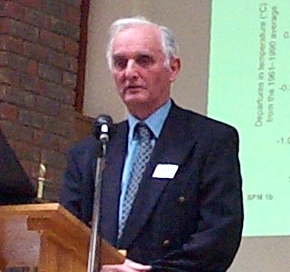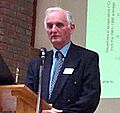John Houghton (physicist) facts for kids
Quick facts for kids
Sir
John Houghton
|
|
|---|---|

Sir John Houghton speaking at a climate change conference in 2005
|
|
| Born |
John Theodore Houghton
30 December 1931 Dyserth, Denbighshire, Wales
|
| Died | 15 April 2020 (aged 88) Wales
|
| Nationality | Welsh |
| Citizenship | United Kingdom |
| Alma mater | Jesus College, Oxford (BA 1951, MA 1955, DPhil 1955) |
| Awards | The Chree Medal and Prize (1979) Japan Prize (2006) Albert Einstein World Award of Science (2009) |
| Scientific career | |
| Fields | Atmospheric physics |
| Institutions | |
Sir John Theodore Houghton (born December 30, 1931 – died April 15, 2020) was a Welsh scientist. He was an expert in atmospheric physics, which is the study of Earth's atmosphere.
Sir John was a very important person in understanding climate change. He was a co-chair of a scientific group called the Intergovernmental Panel on Climate Change (IPCC). This group shared the Nobel Peace Prize in 2007 with Al Gore. Sir John was also the main editor for the first three IPCC reports.
He worked as a professor at the University of Oxford. He was also the Director General of the Met Office, which is the UK's national weather service. He founded the Hadley Centre, a leading climate change research center.
Sir John also led the John Ray Initiative. This group connects environmental science with Christianity. He believed that caring for the Earth is like caring for the Garden of Eden. He was also a founding member of the International Society for Science and Religion.
Contents
Life and Education
John Theodore Houghton was born in Dyserth, Wales. He was the second of three sons. His older brother, David, also became a meteorologist, studying weather.
When John was two, his family moved to Rhyl. He went to Rhyl Grammar School. There, he discovered his strong interest in science. He then studied at Jesus College, Oxford. He earned his first degree in 1951 and his doctorate in 1955.
Beliefs and Family Life
John Houghton grew up in a Christian family. He believed that science and Christianity could support each other. He also strongly believed in Christianity and environmentalism, meaning that faith encourages caring for the environment. His scientific background and beliefs made him a key voice in Christian groups. He advised Tearfund, a Christian aid organization.
In 1962, John married Dr. Margaret Broughton. They had two children and seven grandchildren. After Margaret passed away in 1986, he created a research fund in her memory. Later, he married his second wife, Sheila.
Important Roles and Contributions
Sir John Houghton held many important positions throughout his career. These roles helped him make a big difference in science and environmental policy.
- He was a member of the UK Government Panel on Sustainable Development from 1994 to 2000. This group worked on ways to protect the environment for the future.
- He chaired the Royal Commission on Environmental Pollution from 1992 to 1998. This group advised the government on pollution issues.
- He was a chairman or co-chairman for the scientific group of the Intergovernmental Panel on Climate Change (IPCC) from 1988 to 2002. This is where he played a key role in climate change assessments.
- He was the Director General of the UK Meteorological Office from 1983 to 1991.
- He was a professor of Atmospheric Physics at Oxford University from 1973 to 1983.
He was knighted in 1991, which means he received the title "Sir" for his achievements. Sir John continued to be an honorary scientist at the Hadley Centre and the Rutherford Appleton Laboratory. He moved back to Wales and lived in Aberdyfi. In 2007, he spoke out against a documentary called The Great Global Warming Swindle. He said it had many mistakes.
Sir John Houghton passed away on April 15, 2020, at the age of 88. He died from complications related to COVID-19.
Awards and Recognition
Sir John Houghton received many awards and honors for his important work.
- Albert Einstein World Award of Science (2009)
- Japan Prize (2006)
- International Meteorological Organization Prize (1998)
- Gold Medal of the Royal Astronomical Society (1995)
- Global 500 Award (1994)
- Knight Bachelor (1991)
- Symons Gold Medal, Royal Meteorological Society (1990)
- The Chree Medal and Prize (1979)
- Elected Fellow of the Royal Society (1972)
He also received honorary doctorates from many universities. These are special degrees given to people who have achieved great things. He was an Honorary Fellow of Jesus College, Oxford and the Learned Society of Wales.
Legacy
Sir John Houghton's work left a lasting impact on climate science. In 2013, a metal sculpture of him was put up in Rhyl, his hometown. It stands alongside sculptures of other local famous people.
Selected Books and Reports
Sir John Houghton wrote or edited many important books and scientific reports. These helped people understand climate change and the atmosphere.
- Does God Play Dice? (1988)
- Global Warming, the Complete Briefing (first published 1994, with many updated editions)
- The search for God; can science help? (1995)
- Physics of Atmospheres (first published 1977, with updated editions)
- Climate Change, the IPCC Scientific Assessment (1990, editor)
- Climate Change 1992, the Supplementary Report to the IPCC Scientific Assessment (1992, editor)
- Climate Change 1994, Radiative Forcing of Climate Change and an Evaluation of the IPCC IS92 Emission Scenarios (1994, editor)
- Climate Change 1995, the Science of Climate Change (1995, editor)
- Climate Change 2001, The Scientific Basis (2001, editor)
Correcting a Misquote
In 2006, a journalist wrongly quoted Sir John Houghton. The quote was "Unless we announce disasters, no one will listen." This quote was said to be from his book Global Warming, The Complete Briefing. However, Sir John never said this, and the quote is not in his book. He actually believed the opposite.
The publishers of a book that repeated this misquote later apologized. They confirmed the quote would not be used again. Sir John also worked to correct this mistake in newspapers.
His actual quote was: "If we want a good environmental policy in the future we'll have to have a disaster. It's like safety on public transport. The only way humans will act is if there's been an accident." This shows he believed people often only act after a problem happens, not that scientists should make up disasters.
Images for kids
See also
 In Spanish: John T. Houghton para niños
In Spanish: John T. Houghton para niños
 | Sharif Bey |
 | Hale Woodruff |
 | Richmond Barthé |
 | Purvis Young |


